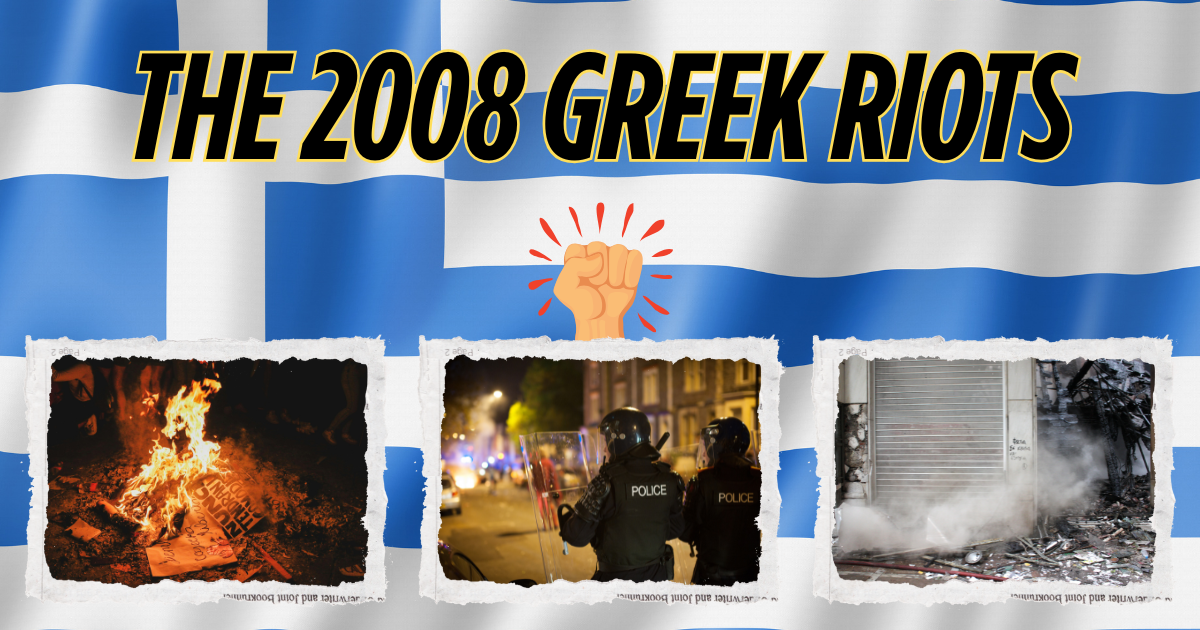The 2008 Greek Riots: A Nation Ignited by Police Violence and Economic Strife. You must have heard or read about the 2008 Greek Riots. If you haven’t, then you will know all about it by the end of the article. It was a riot where a schoolchild was killed, and there was severe destruction everywhere. The riot was started by young Greeks, and it was a protest by them. If you want to know more about the topic “The 2008 Greek Riots: A Nation Ignited by Police Violence and Economic Strife,” read the complete article.
The 2008 Greek Riots
Greece’s worst rioting in years erupted late Sunday night after an Athens policeman shot and killed a teenage boy in a central neighborhood known as the base of anarchist and other antiestablishment groups. The protesters were young citizens of Greece. They clashed with police officers in the Greek capital as they marched through the city to remember the ninth anniversary of a police shooting that killed a teenager. A major department store and a huge Christmas tree outside parliament were also set alight.

For over two weeks before Christmas Day 2008, television screens around the world were filled with lurid pictures of huge crowds in most Greek cities attacking riot police with rocks and Molotov cocktails and wrecking shops and banks. In a country characterized by the frequency of violent demonstrations, these were by far the most serious since the creation of the modern democratic system in 1974. There were sympathetic demonstrations in at least nine European capitals and in several other major European cities.
A Nation Ignited by Police Violence and Economic Strife
The early morning violence during which students threw stones and firebombs at police gave way to peace as Greeks returned to work after a 24-hour general strike yesterday against the conservative government’s economic policies. Public anger at the shooting remains high, as the 37-year-old policeman charged with murdering the teenager has not expressed remorse to investigators. The officer, who showed up in court yesterday, said he had fired warning shots in self-defense that rebounded to kill the youth.
The violence rapidly spread to other parts of the country, including Greece’s second city, Thessaloniki, and the vacation islands of Crete and Corfu. Late at night, clashes were reported in Athens and the northern town of Salonika before quieting down in the early morning hours, according to the state radio. About 120 protestors remain barricaded in Athens Polytechnic University as well as buildings housing the law and philosophy departments. They continued to fight police until around 2 a.m. local time.
The Youth’s View of the Government
The intentions of the youthful demonstrators can be determined from the claims of some of their spokespersons and the comments of observers. Although at first encouraged by fury over the killing, the demonstrators were increasingly motivated in time by anger at the entire system of government. In reply to a national poll of 2,123 adults in the period 17-23 December 2008, 55% agreed that the demonstrations were “a genuine protest against the crisis—political, social, economic—in which our country finds itself.” Fear of unemployment, a lack of ideals and role models, issues with the educational system, and a failure to recognize talent in both personal and professional development were deemed to be the main motivators.
Charges on Policeman
Two police officers have been charged over the shooting — one with intentional murder and the other with aiding and encouraging him. A police statement said one officer fired three shots after their car was attacked by a group of 30 youths in the bohemian Athens district of Exarchia. A police official said the officer has described firing warning shots, but witnesses told TV he took aim at the boy, recognized as Alexandros Grigoropoulos.
For most of Sunday, protesters shouting “Cops, Pigs, Murderers” rained petrol bombs down on rows of Athens riot police, while helicopters hovered overhead and tear gas choked the city. More than 30 shops and a dozen banks were burned in the capital’s busiest commercial districts ahead of the busy Christmas period.
Aftermath
The shooting and its violent aftermath were likely to heighten a decade-long conflict that has simmered between police and far-left groups. The police did not bravely take bold action against any but defenseless groups, such as immigrants, for fear of disapproval by politicians and the media. The two police officers involved in the shooting were arrested in an effort to quell the rioters by the conservative government, which was already having trouble holding onto power following a recent land exchange scandal.



